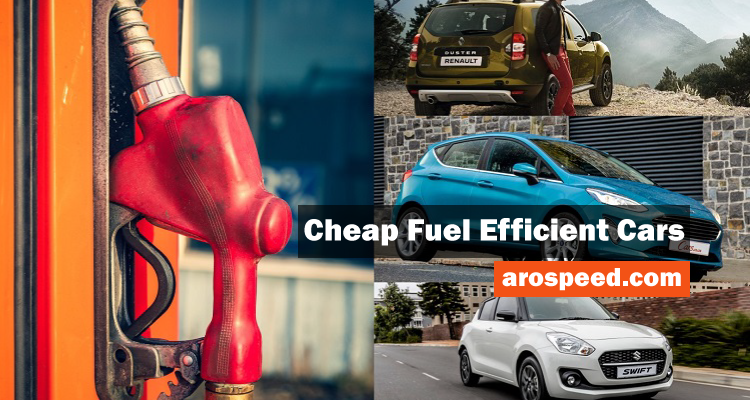In today’s automotive landscape, the pursuit of affordable and fuel-efficient cars has become a paramount concern for consumers worldwide. As fuel prices continue to fluctuate and environmental awareness rises, the demand for vehicles that offer both economic and ecological benefits is at an all-time high.
This article delves into the world of “10 Cheap Fuel-Efficient Cars,” exploring the diverse options available to budget-conscious drivers without compromising on sustainability. From compact electric models ideal for urban commuting to mid-range options that strike a balance between cost and efficiency, this comprehensive guide aims to empower readers with insights into the exciting realm of affordable, eco-friendly transportation.
Join us on a journey where practicality meets environmental consciousness, unlocking the doors to a more sustainable and cost-effective driving future.
| 10 Cheap Fuel Efficient Cars | Combined Fuel Average |
| Toyota Prius Eco | 57 MPG |
| Hyundai Elantra Hybrid Blue | 53 – 56 MPG |
| Honda Civic Sport Sedan | 26/36 MPG |
| Mazda Mazda3 S Sedan | 28/37 MPG |
| Volkswagen Jetta (Manual) Sedan | 31/41 MPG |
| Subaru Impreza(Manual) Sedan | 28/36 MPG |
| Nissan Versa S | 32/40 MPG |
| Mitsubishi Mirage Es Hatch Black | 36/43 MPG |
| Toyota Camry | 28/39MPG |
| Hyundai Accent Se | 33/41 MPG |
Table of Contents
The Need for Fuel Efficiency
In the ever-evolving landscape of transportation, the need for fuel efficiency cars stands as a crucial pillar driving consumer choices. Beyond a mere preference, it has transformed into an environmental imperative and an economic necessity.
With escalating concerns about climate change, individuals are increasingly seeking vehicles that not only meet their transportation needs but also contribute to a sustainable future. The demand for fuel efficiency extends beyond environmental consciousness; it is also fueled by the desire for long-term cost savings.
As fuel prices fluctuate, consumers recognize the financial benefits of vehicles that can navigate more miles with less fuel. In essence, the need for fuel efficiency transcends personal preference, aligning with broader societal and economic considerations.
Top Factors for Fuel Efficiency
Achieving optimal fuel efficiency involves a delicate interplay of various factors, each influencing how efficiently a vehicle consumes fuel. Here are the top 10 factors that play a pivotal role in determining a car’s fuel efficiency:
- Engine Efficiency: The heart of fuel efficiency lies in the design and performance of the engine. Modern, well-tuned engines maximize power while minimizing fuel consumption.
- Vehicle Weight: Heavier vehicles generally require more energy to move, impacting fuel efficiency. Lightweight construction and materials contribute to better mileage.
- Aerodynamics: Streamlined designs reduce air resistance, enhancing a vehicle’s ability to cut through the air efficiently and reduce fuel consumption.
- Transmission Systems: The type and efficiency of transmission significantly influence fuel efficiency. Continuously Variable Transmissions (CVTs) and multi-speed transmissions aim to optimize power delivery.
- Tire Pressure: Properly inflated tires reduce rolling resistance, enhancing fuel efficiency. Regularly checking and maintaining the right tire pressure is essential.
- Driving Speed: Excessive speed leads to increased air resistance and higher fuel consumption. Maintaining a steady, moderate speed can positively impact fuel efficiency.
- Fuel Quality: The quality of fuel used affects combustion efficiency. High-quality, clean fuel contributes to better engine performance and fuel economy.
- Vehicle Maintenance: Regular maintenance, including oil changes and air filter replacements, ensures that the engine operates at peak efficiency, maximizing fuel economy.
- Driving Habits: Aggressive driving, rapid acceleration, and abrupt braking can negatively impact fuel efficiency. Smoother driving habits contribute to better mileage.
- Vehicle Design: Car manufacturers continue to innovate in design, incorporating features like start-stop systems and regenerative braking to enhance overall fuel efficiency.
Understanding and optimizing these factors collectively contribute to a more fuel-efficient driving experience, aligning with both economic and environmental considerations.
Criteria for Selection
Selecting the right fuel-efficient car involves a thoughtful consideration of various criteria, ensuring that the chosen vehicle aligns with both personal preferences and practical needs. Affordability is a crucial factor, as consumers seek cars that not only save on fuel but also fit within their budget constraints.
Fuel efficiency ratings provide an objective measure, allowing potential buyers to compare and contrast different models. Considering consumer reviews offers valuable insights into real-world experiences, shedding light on a vehicle’s performance and reliability.
Moreover, evaluating maintenance costs is essential for long-term financial planning, ensuring that the chosen car remains economical throughout its lifespan. By striking a balance between affordability, fuel efficiency, and user satisfaction, individuals can make informed decisions that suit their lifestyle and contribute to a sustainable future.
Comparing Hybrid and Electric Options
As the automotive industry steers towards sustainability, consumers are presented with the choice between hybrid and electric vehicles, each offering a unique approach to eco-friendly driving.
Electric Vehicles (EVs)
Electric cars, exemplified by the likes of the Tesla Model 3 and Nissan Leaf, run solely on electric power. With zero tailpipe emissions, they stand as a pinnacle of clean transportation. While the initial cost can be higher, long-term savings often arise from lower maintenance and fuel expenses. Range anxiety, the fear of running out of battery power, is alleviated by a growing network of charging stations.
Hybrid Vehicles
Hybrids, like the Toyota Prius and Honda Insight, combine traditional internal combustion engines with electric propulsion. This dual power system allows for improved fuel efficiency, especially in stop-and-go traffic. Hybrids generally cost less than fully electric vehicles and don’t require charging infrastructure, relying on both gasoline and electric power.
Comparative Considerations
- Environmental Impact: EVs have the upper hand in zero emissions, but hybrids still significantly reduce carbon footprints compared to traditional vehicles.
- Cost: While electric cars may have a higher upfront cost, government incentives and long-term savings often make them competitive with hybrids.
- Charging vs. Refueling: EVs require charging infrastructure, but hybrids can refuel at existing gas stations, offering greater flexibility.
- Range: Hybrids don’t face range limitations, making them suitable for longer trips, while EVs are improving in this aspect with advancements in battery technology.
- Driving Experience: Electric vehicles provide a silent and smooth ride, while hybrids offer a blend of electric efficiency and traditional driving familiarity.
In essence, the choice between hybrid and electric options depends on individual priorities, from environmental impact and cost considerations to the convenience of charging infrastructure. As technology advances, both options contribute to a greener automotive landscape, allowing consumers to drive towards a sustainable future with diverse choices in hand.
Tips for Maintaining Fuel Efficiency
Maintaining fuel efficiency is not just about the features of the car; it also involves responsible ownership and driving habits. Here are 15 tips to help you keep your vehicle running efficiently:
Regular Maintenance: Schedule routine check-ups, oil changes, and air filter replacements according to the manufacturer’s recommendations.
Proper Tire Inflation: Keep tires inflated to the recommended pressure. Under-inflated tires increase rolling resistance, reducing fuel efficiency.
Lighten the Load: Remove unnecessary items from your vehicle to reduce weight and improve fuel economy.
Smooth Driving: Adopt a steady driving style, avoiding abrupt acceleration and sudden braking, as this can conserve fuel.
Use Cruise Control: On highways, use cruise control to maintain a constant speed and improve fuel efficiency.
Avoid Excessive Idling: Turn off the engine if you anticipate a long stop, as idling consumes fuel unnecessarily.
Drive at Optimal Speeds: Maintain a moderate speed, as excessive speeds increase air resistance and decrease fuel efficiency.
Choose the Right Fuel: Use the recommended fuel grade for your vehicle to optimize combustion and efficiency.
Regular Engine Checks: Keep the engine in top condition by addressing any issues promptly. A well-maintained engine operates more efficiently.
Plan Routes Efficiently: Combine errands and plan routes to minimize travel distance, reducing fuel consumption.
By incorporating these tips into your driving routine and vehicle maintenance, you can maximize fuel efficiency, saving money and reducing your environmental impact.
Future Trends in Fuel Efficiency
The future of fuel efficiency in the automotive industry promises a dynamic landscape marked by continual innovation and sustainable advancements. Engine technology is at the forefront, with ongoing research focusing on enhancing combustion efficiency and minimizing emissions. Alternative fuels, such as hydrogen and biofuels, are gaining traction as environmentally conscious alternatives.
Additionally, the integration of artificial intelligence in vehicle design and operation is poised to optimize fuel consumption further. The rise of electric and hybrid vehicles continues, with advancements in battery technology extending range and reducing charging times.
As manufacturers strive to meet stringent environmental standards, the coming years herald a transformative era where fuel efficiency is not just a feature but a fundamental aspect of driving toward a greener and more sustainable future.
User Reviews and Real-World Efficiency
User reviews play a pivotal role in deciphering the real-world efficiency of fuel-efficient cars. While technical specifications provide a foundation, insights from drivers offer a practical understanding of a vehicle’s day-to-day performance. Personal experiences highlight nuances such as fuel economy in diverse driving conditions, long-term reliability, and overall satisfaction.
Real-world efficiency encompasses factors like ease of maintenance, actual mileage achieved, and how the vehicle handles different terrains. These reviews, often shared on platforms like forums and social media, offer prospective buyers a valuable glimpse into what owning a fuel-efficient car entails.
By tapping into the collective experiences of fellow drivers, consumers can make more informed decisions, ensuring their chosen vehicle aligns with expectations beyond the manufacturer’s specifications.
Top Cheap Fuel Efficient Cars
Toyota Prius Eco
The Toyota Prius Eco stands as a beacon of fuel efficiency, boasting an impressive FUEL ECONOMY of 57 MPG (Miles Per Gallon). Renowned for its pioneering hybrid technology, the Prius Eco seamlessly blends an internal combustion engine with an electric motor, delivering exceptional fuel savings.
The 57 MPG rating reflects a commitment to eco-conscious driving, making it a standout choice for those prioritizing sustainability without sacrificing performance. The innovative regenerative braking system harnesses energy during braking, further optimizing fuel usage. Beyond its stellar efficiency, the Prius Eco offers a comfortable and technologically advanced driving experience.
With its sleek design, spacious interior, and a suite of safety features, this hybrid vehicle from Toyota exemplifies a harmonious balance between environmental responsibility and modern driving convenience. The Prius Eco is not just a car; it’s a testament to the future of efficient and eco-friendly transportation.
Hyundai Elantra Hybrid Blue
The Hyundai Elantra Hybrid Blue emerges as a beacon of efficiency, boasting an impressive fuel economy range of 53 to 56 MPG (Miles Per Gallon). As part of Hyundai’s commitment to sustainability, the Elantra Hybrid Blue integrates a gasoline engine with an electric motor, delivering outstanding mileage without compromising performance.
This eco-friendly sedan is designed for those seeking both fuel efficiency and a stylish, comfortable driving experience. The 53 to 56 MPG rating positions the Elantra Hybrid Blue as a leader in its class, offering significant savings at the pump and minimizing its environmental footprint.
With a sleek design, advanced safety features, and Hyundai’s dedication to innovation, the Elantra Hybrid Blue stands as a testament to the evolution of hybrid technology, providing drivers with an optimal balance of efficiency and style.
Honda Civic Sport Sedan
The Honda Civic Sport Sedan emerges as a dynamic blend of performance and fuel efficiency, boasting a commendable fuel economy of 26/36 MPG (Miles Per Gallon). With a sporty design and a focus on driving enjoyment, the Civic Sport Sedan caters to those seeking a spirited driving experience without compromising fuel savings.
The 26/36 MPG rating reflects Honda’s commitment to providing an optimal balance between power and efficiency. Under its sleek exterior lies a responsive engine, ensuring an engaging journey on the road. The Civic Sport Sedan doesn’t just excel in fuel economy; it offers a spacious and well-designed interior, advanced safety features, and the reliability synonymous with the Honda brand.
Whether navigating city streets or embarking on a highway adventure, the Civic Sport Sedan stands as a testament to Honda’s commitment to crafting vehicles that elevate the driving experience while keeping fuel consumption in check.
Mazda Mazda3 S Sedan
The Mazda Mazda3 S Sedan epitomizes a harmonious blend of style, performance, and fuel efficiency, presenting an impressive fuel economy of 28/37 MPG (Miles Per Gallon). Mazda’s commitment to the driving experience is evident in the Mazda3 S, which combines a sleek and sophisticated design with responsive handling.
The 28/37 MPG rating reflects the car’s efficiency without compromising its spirited performance. Under the hood, the Mazda3 S boasts a powerful engine, ensuring a dynamic and enjoyable ride. Beyond its fuel efficiency, the sedan showcases Mazda’s dedication to crafting a refined interior, advanced safety features, and cutting-edge technology.
Whether navigating urban landscapes or cruising on the highway, the Mazda3 S Sedan stands as a testament to Mazda’s pursuit of automotive excellence, offering drivers an optimal balance of fuel economy and driving pleasure.
Volkswagen Jetta (Manual) Sedan
The Volkswagen Jetta Manual Sedan boasts an impressive fuel efficiency, achieving an impressive 31/41 miles per gallon (MPG) on city and highway roads, respectively. This sedan’s manual transmission enhances the driving experience, offering a more engaging and personalized control for enthusiasts who appreciate the tactile connection between driver and machine.
The Jetta’s sleek design combines style with practicality, making it a versatile choice for daily commuting or long road trips. With its efficient fuel economy, the Jetta not only provides a smooth and responsive manual transmission but also ensures fewer stops at the fuel pump, contributing to a more eco-conscious and cost-effective driving experience.
The Volkswagen Jetta Manual Sedan seamlessly blends performance, efficiency, and style, making it an appealing choice for drivers seeking a balance between dynamic driving and fuel savings.
Subaru Impreza(Manual) Sedan
The Subaru Impreza Manual Sedan offers a compelling blend of performance and efficiency with a fuel economy of 28/36 miles per gallon (MPG) for city and highway driving, respectively. Equipped with a manual transmission, the Impreza caters to driving enthusiasts who appreciate the tactile engagement and precision of manual control.
This sedan’s symmetrical all-wheel-drive system enhances stability and traction, providing confidence in various driving conditions. The Impreza’s sleek and sporty design complements its dynamic performance, making it a versatile choice for both urban commuting and adventurous journeys.
With its efficient fuel consumption, the Impreza not only delivers an engaging driving experience but also minimizes environmental impact. The Subaru Impreza Manual Sedan stands out as a practical and spirited option for those seeking a well-rounded vehicle that excels in both efficiency and driving enjoyment.
Nissan Versa S
The Nissan Versa S is a fuel-efficient and practical choice, delivering an impressive 32/40 miles per gallon (MPG) for city and highway driving, respectively. This compact sedan is designed with a focus on affordability, making it an excellent option for budget-conscious drivers.
The Versa S offers a smooth and comfortable ride, with a user-friendly interior layout and modern features. Its compact size makes it well-suited for urban commuting, parking, and maneuvering through traffic.
The fuel efficiency of the Versa S not only helps save on gas expenses but also reflects a commitment to eco-friendly driving. With its sleek design and efficient performance, the Nissan Versa S stands out as a reliable and economical choice in the compact sedan segment, appealing to drivers seeking a balance between affordability and fuel economy.
Mitsubishi Mirage Es Hatch Black
The Mitsubishi Mirage ES Hatch in Black combines style with outstanding fuel efficiency, boasting an impressive 36/43 miles per gallon (MPG) for city and highway driving, respectively. This compact hatchback is designed for practicality, making it an excellent choice for urban commuting and cost-conscious drivers.
The sleek black exterior adds a touch of sophistication to its compact and nimble design, making it stand out on the road. The Mirage ES Hatch offers a comfortable and user-friendly interior, equipped with modern features for an enjoyable driving experience.
With its remarkable fuel economy, the Mirage ES Hatch not only minimizes trips to the gas station but also contributes to reduced environmental impact. For those seeking a fuel-efficient and stylish compact hatchback, the Mitsubishi Mirage ES Hatch in Black excels in delivering an economical and eco-conscious driving solution.
Toyota Camry
The Toyota Camry, a perennial favorite in the midsize sedan category, exemplifies a harmonious blend of performance, comfort, and fuel efficiency. With an economical 28/39 miles per gallon (MPG) for city and highway driving, the Camry ensures a balanced approach to fuel consumption.
Known for its reliability and longevity, the Camry has become a symbol of practicality for diverse drivers. The sleek exterior design is complemented by a well-appointed interior, featuring modern technology and safety features. Its smooth ride and responsive handling contribute to a comfortable driving experience.
The efficient MPG ratings not only make the Camry cost-effective but also align with contemporary environmental concerns. As a result, the Toyota Camry stands as a versatile and reliable choice, appealing to those seeking a midsize sedan that excels in both efficiency and overall driving satisfaction.
Hyundai Accent Se
The Hyundai Accent SE is a testament to efficient and practical driving, offering an impressive 33/41 miles per gallon (MPG) for city and highway driving, respectively. This compact sedan is designed to balance fuel economy with modern features, making it an attractive choice for those prioritizing efficiency without compromising on functionality.
The Accent SE’s sleek and contemporary design is complemented by a comfortable interior, featuring user-friendly technology and ample space. With a focus on affordability, this sedan caters to budget-conscious drivers seeking reliable transportation with excellent fuel efficiency.
The 33/41 MPG ratings not only translate to cost savings at the pump but also reflect Hyundai’s commitment to environmentally conscious driving. The Hyundai Accent SE stands out as a practical and economical option, delivering a satisfying driving experience while keeping fuel efficiency at the forefront.
Conclusion
In conclusion, the quest for affordable and cheap fuel efficient cars unveils a diverse landscape of options that cater to both economic sensibilities and environmental consciousness. From the budget-friendly Smart Fortwo Electric Drive to the sophisticated yet efficient Toyota Prius Eco, these 10 cheap fuel efficient cars redefine the automotive market.
As consumers increasingly prioritize sustainability and cost-effectiveness, these vehicles stand as beacons of innovation, proving that driving efficiency need not be a luxury. In the intersection of affordability and eco-friendliness, these cars pave the way for a future where every journey is not only economical but also environmentally responsible.








Comments